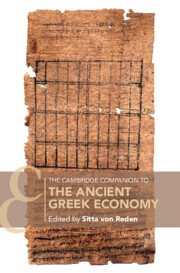Book contents
- The Cambridge Companion to the Ancient Greek Economy
- The Cambridge Companion to the Ancient Greek Economy
- Copyright page
- Contents
- Maps
- Notes on the Contributors
- Abbreviations
- Maps
- 1 Introduction
- Part I Diachronic Perspectives
- Part II Regional Perspectives
- Part III Structures and Processes
- Part IV Networks
- Part V Performance
- Theoretical Approaches
- 22 Political Economy and the Growth of Markets and Capital
- 23 New Institutional Economics, Economic Growth, and Institutional Change
- 24 Regionalism, Federalism, and Mediterranean Connectivity
- Empirical Approaches
- References
- Index
- Cambridge Companions to the Ancient World
23 - New Institutional Economics, Economic Growth, and Institutional Change
from Theoretical Approaches
Published online by Cambridge University Press: 21 July 2022
- The Cambridge Companion to the Ancient Greek Economy
- The Cambridge Companion to the Ancient Greek Economy
- Copyright page
- Contents
- Maps
- Notes on the Contributors
- Abbreviations
- Maps
- 1 Introduction
- Part I Diachronic Perspectives
- Part II Regional Perspectives
- Part III Structures and Processes
- Part IV Networks
- Part V Performance
- Theoretical Approaches
- 22 Political Economy and the Growth of Markets and Capital
- 23 New Institutional Economics, Economic Growth, and Institutional Change
- 24 Regionalism, Federalism, and Mediterranean Connectivity
- Empirical Approaches
- References
- Index
- Cambridge Companions to the Ancient World
Summary
Over the last twenty years, New Institutional Economics (NIE) has been a highly influential model in the study of the Greek and Roman economy. Although both its assumptions and methods are controversial, NIE approaches have changed the agenda of ancient economic history. The overall goal of neo-institutional economic history is to explain economic development, and notably growth, in line with a much-quoted phrase by the Nobel-prize winning economist Douglass North, that it is the task of economic history to explain the structure and performance of economies through time. NIE approaches and methods have therefore stimulated quite specific research directions in ancient economic history. This chapter suggests that NIE offers a fruitful conceptual matrix for asking new questions – with or without the answers necessarily staying within the NIE model. By contrast, the aim of the NIE method to predict and quantify outcomes, and the broader implications of the approach, are far more difficult to accept and defend. Particularly problematic is its commitment to certain kinds of growth as the desirable outcome of economic development, together with the assumption of the universal benefits of that growth, with its end point and golden standard explicitly or implicitly based on successful economies of the modern West.
Keywords
- Type
- Chapter
- Information
- The Cambridge Companion to the Ancient Greek Economy , pp. 347 - 359Publisher: Cambridge University PressPrint publication year: 2022



